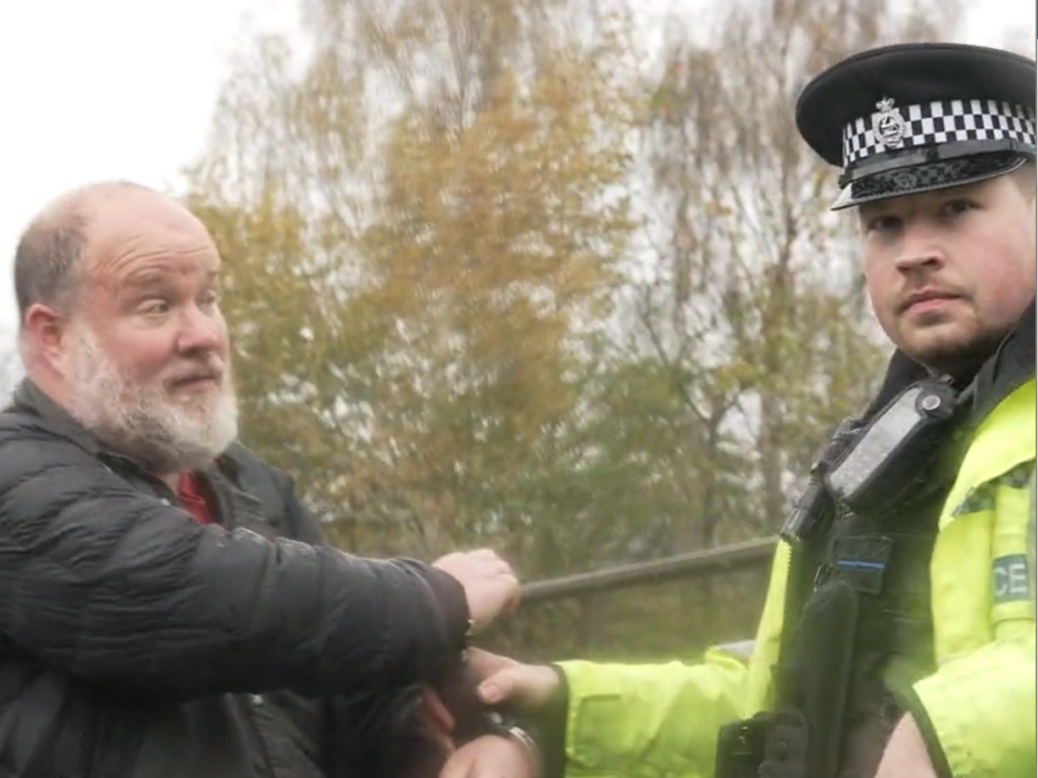
The arrest of four journalists covering Just Stop Oil protests by Hertfordshire Police earlier this month may have constituted “unlawful interference” in their freedom of expression, a review has found.
The review, carried out by another police force, said the operation’s commanders gave officers “direction to arrest” but no alternatives for dealing with anyone present at the M25 protest.
Plans drawn up before the operation did not anticipate the appearance of reporters at the incident. This made arrests “the likely outcome” of officers’ interactions with journalists, according to the review.
[Read more: Three journalists locked up for covering M25 protest – Herts Police ‘personally apologises’]
The review makes five recommendations to Herts Police, including that officers complete a joint National Union of Journalists and College of Policing training package on interacting with the media within 30 days.
Officers are already expected to complete that package, although two arresting officers involved in November’s incident appear not to have done so. The two others involved had watched it – one in January 2021 and one on 26 October 2022, two weeks prior.
Herts Police arrested four journalists covering Just Stop Oil protests on the M25 across 8 and 9 November, accusing them of conspiracy to commit public nuisance.
Three of them – documentary photographer Rich Felgate, press photographer Tom Bowles and LBC reporter Charlotte Lynch – were identified at the time. According to the police review an unnamed fourth journalist was also arrested, a fact that had not previously been confirmed.
The three named journalists all showed or offered to show their press cards to officers, but were arrested nonetheless. Bowles and Felgate were held for approximately thirteen hours, and officers attended Bowles’ home overnight while he was detained. Lynch was held for five hours.
Herts Police chief constable Charlie Hall asked neighbouring Cambridgeshire Constabulary to review the operation, named Operation Carious.
The review found there were failures to adequately plan for the likely presence of media at Just Stop Oil protests, and that officers were directed to carry out arrests by commanders without adequate rationale.
It said a “generic” plan in place for the protest included a “bland” list of legislation with no reference as to why it was applicable, and set “no intervention policy or tactical parameter”.
“None of the original plans made specific mention of members of the press or media and what their role entails and what the response should be,” it said.
Despite that, the review added: “It was entirely foreseeable that journalists were going to be present at sites of activity with a view of reporting.”
The review team “were surprised to discover” there was no Public Order Public Safety (POPS) advisor assigned to a junior commander.
“The evidence in this case indicates officers were directed to arrest and did not develop sufficient grounds prior to exercising their power,” the reviewers wrote.
“Having reviewed the evidence and the information available to the officers at the time there seems to be a disconnect as to how they arrived at the outcome they did.
“The interactions of officers suggest that arrest was the likely outcome regardless of the information obtained.”
The review noted: “All officers engaged with public order operations… are required to watch and complete the CoP National Union of Journalists (NUJ) video which explains the rights of reporters and photographers during public order situations. There is a requirement to refresh this every three years.”
The review concludes that “officers had a lack of understanding as to the role of the media and how they operate”, and that “police powers were not used appropriately… There is evidence to suggest the potential for the arrests to amount to an ‘unlawful interference’ with the individual’s freedom of expression under Article 10 ECHR,” referring to the European Convention on Human Rights.
Going forward it advises Herts Police to select commanders with “commensurate skills and experience when balanced against the nature of the operation”, to improve decision logging, mentoring and advisors’ involvement in operations, and to make sure officers complete the NUJ-CoP training.
Herts Constabulary said it intends to identify officers who have not yet undergone training and ensure they complete it within 30 days.
Herts chief constable Charlie Hall said: “Whilst the review has correctly concluded that the arrests of the journalists were not justified, and that changes in training and command need to be made, it found no evidence to indicate that officers acted maliciously or were deliberately disproportionate.”
Hall wrote to the affected journalists after their arrest saying he was “truly sorry” for their detainment.
The NUJ’s assistant secretary Séamus Dooley said the review “vindicates” the union’s “strong stand” and gave “important recognition that police powers were not used appropriately”.
He backed the recommendations, especially improved training of officers using the union’s resources, adding: “We need a consistent approach across all police so that journalists are not restricted on the whim of individual constabularies.”
[Read more: Journalist arrests could be ‘commonplace’ under Public Order Bill, campaigners warn]
Email pged@pressgazette.co.uk to point out mistakes, provide story tips or send in a letter for publication on our "Letters Page" blog
